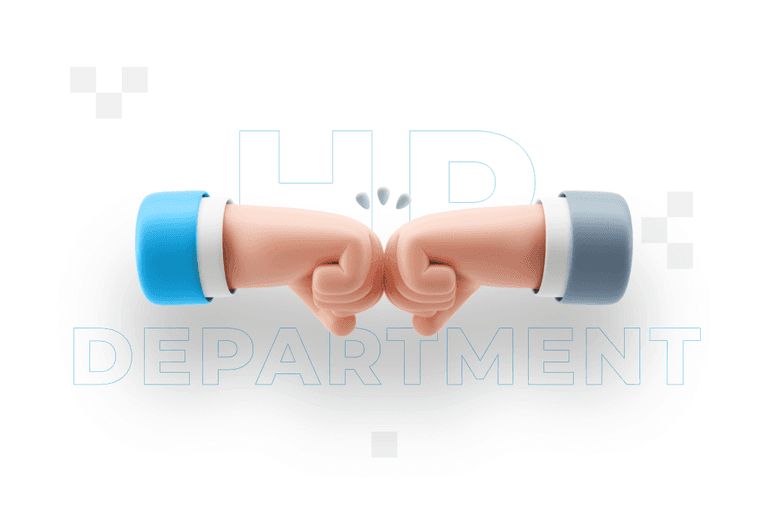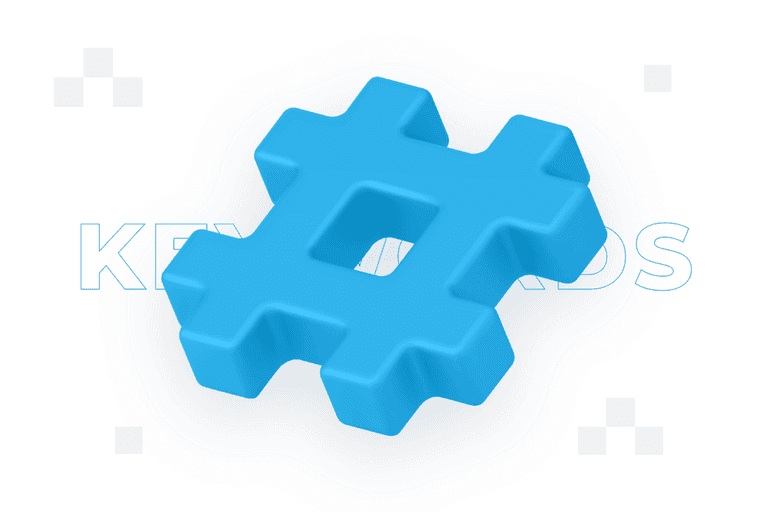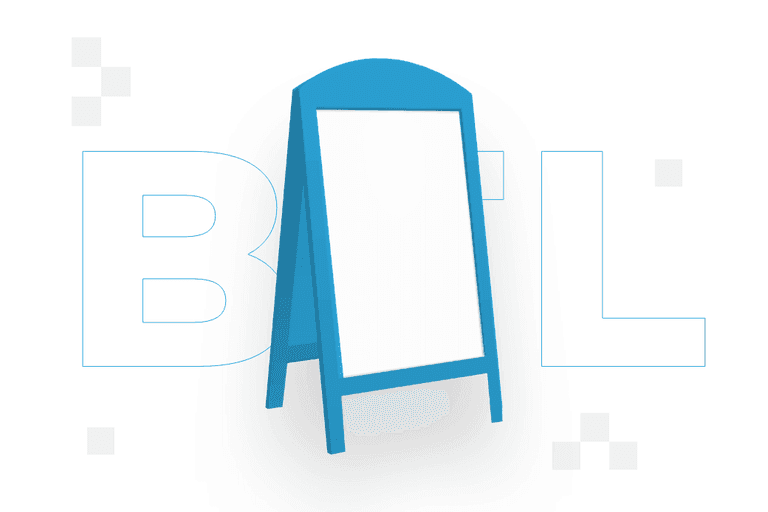
HR department – what is it and what does it do?

The HR department plays a vital role in harmonising employee relations and achieving business goals. Its activities shape the company culture, support talent development and contribute to the overall success of the business.
From this article you will learn:
- What is an HR department?
- What is the difference between the HR department and human resources?
- What tasks does the HR department perform?
- How do you set up an HR department?
- How to find a job in the HR department?
- What does a company gain from an HR department?
HR department – definition
The HR department, also known as the human resources department, is the part of the organisation that focuses on the management of the company’s personnel. Its most important task is to make the best use of the talents and skills of the employees in order to achieve the strategic objectives of the company, while taking care of the well-being, development and satisfaction of the employees.
The HR (human resources) department is the sector of the organisation responsible for managing employee affairs, focusing on the recruitment, development, support and employment of staff in order to maximise their contribution to the success of the company.
Definition of HR department.
The HR department brings management and employees together and plays an important role in shaping the organisational culture, the structure of the company, and the response to the changing needs of the labour market and business.
HR department versus human resources
The terms ‘HR’ and ‘human resources’ are often used interchangeably, but there are subtle differences and interrelationships between the two that determine the specifics of how each area functions within an organisational structure. HR traditionally focuses on a broader spectrum of strategies related to the people in an organisation – including organisational culture in a company, motivation, talent management and development, training or performance appraisal, among others. This is integrated into the overall business strategy and aims not only to attract, but also to develop and retain employees. HR is therefore characterised by a strategic and long-term approach.
On the other hand, the term ‘HR’ often refers to the more administrative and transactional aspects of personnel management. This includes tasks such as processing salaries, administering benefits, monitoring working time, leave and attendance, as well as handling employee documentation and compliance with employment legislation. The HR department is therefore more direct and short-term in its operations. Despite these differences, HR and HR are closely intertwined and often work together (often within the same team) so that the organisation can manage its employees effectively and efficiently.
Tasks of the HR department
HR management can be divided into two main approaches, known as hard HR and soft HR. They represent the different strategies and methods of personnel management in an organisation and influence the way companies treat employees and the HR activities undertaken. Both approaches have their place in HR strategy and best practice often combines them to meet both business objectives and employee needs.
Tough HR
Hard HR treats employees first and foremost as an organisational resource that must be managed in a way that maximises return on investment and operational efficiency. In this approach, people are viewed almost like any other resource in the company (just like capital or raw materials), meaning that the main objective is to increase productivity and reduce employment-related costs. The tasks of hard HR include:
- Labour cost control and HR budgeting involves monitoring and optimising personnel-related expenses. This includes determining payroll, benefits, recruitment and training costs, as well as forecasting future needs in these areas to ensure financial efficiency and budget alignment with the company’s strategic goals.
- Workforce planning and needs forecasting is the strategic process of determining future workforce requirements. It analyses market trends, demographics and business objectives to predict talent needs and identify skills gaps. This enables companies to prepare their staff recruitment process, training and development process, ensuring business continuity and innovation.
- Optimising work processes and procedures involves improving the day-to-day tasks and operations in an organisation to increase productivity and reduce wasted resources. This can include, but is not limited to, introducing new technology, training teams, improving communication and reorganising structures, which serves to improve efficiency, speed of task completion and overall quality of work.
- Performance management is the process of evaluating and improving the performance of employees, promoting their development and the achievement of company goals. It uses appraisal systems to regularly monitor progress, identify areas for improvement and set targets. Incentive systems are an integral part, offering rewards, such as bonuses, promotions or recognitions, for outstanding performance, stimulating engagement and productivity.
- Recruitment and selection is the process of identifying, attracting and selecting candidates best suited to specific roles within the organisation. Central to it is understanding the requirements of the job and the company culture, and then focusing on the skills, experience and personal qualities of the candidates.
- Time management and accounting involves monitoring and documenting employee hours, including overtime, holidays and breaks, ensuring accuracy and compliance. This allows you to track productivity, prevent fraud, fairly compensate employees for their time, and align resources with current business needs.
- Liaison with government agencies includes interacting and liaising with government bodies and regulators to ensure compliance with labour laws, safety standards and other regulatory issues. HR is also involved in reporting relevant data, responding to the institutions’ queries, representing the company during inspections and keeping the company up-to-date on changes in the law.
Soft HR
Soft HR focuses on the human aspect of management, viewing employees as those most able to contribute to the ongoing success of the organisation through their skills, knowledge and experience. In this model, the focus is on the needs, development and well-being of employees, promoting a culture based on trust, openness, and commitment. Typical soft HR tasks include:
- Development and training focuses on strengthening employees’ skills, knowledge and competencies through a variety of educational programmes. By investing in courses, workshops, soft and technical training, companies promote the continuous professional development of the team, increase efficiency, improve adaptability to market changes and increase employee engagement, which translates into increased productivity and competitiveness for the company.
- Talent management is a holistic approach to optimising employee potential that focuses on attracting, identifying, developing, engaging and retaining highly skilled individuals. Through talent pools, individual career paths, mentoring, training or promotion opportunities, organisations create a challenge-ready workforce and support both the personal development of employees and the long-term strategic goals of the company.
- Building organisational culture and employee engagement is the process of shaping a working environment that promotes shared values, goals and behaviours. Through initiatives such as transparent communication, recognising successes, ensuring work-life balance and building team spirit, companies create a positive, motivating workplace. This in turn increases employee loyalty, productivity and overall satisfaction, leading to greater cohesion and improved organisational performance.
- Wellbeing and work-life balance programmes support employee health and overall satisfaction through a variety of initiatives. These include, but are not limited to, flexible working hours, remote working, mental health support and other benefits that ensure employee wellbeing and increase engagement at work.
- Mediating and managing relationships in the workplace involves skilfully resolving conflicts and building strong, healthy bonds between employees. To achieve this, HR provides interpersonal communication training, provides support from neutral mediators and promotes openness to diversity of thought. Through these initiatives, organisations build a positive, supportive work environment that stimulates collaboration, respect and shared values.
Creating an HR department
Creating an effective HR department starts with understanding the business, including its culture, industry, market, and current and future challenges. A strong HR department should focus not only on building a responsive team, but also anticipating difficulties and developing strategies to address them. It should also have a clear vision of how its actions affect the overall mission of the company, which requires integration with the company’s strategic plans and an understanding of how individual talent and organisational culture affect the achievement of business goals.
When forming a team, consider different specialisations and skills. Experience in areas such as data analytics, employment law, employee benefits, talent development and organisational change will be key to the effectiveness of the HR department. A modern HR department should also use advanced analytical tools and technology to collect data, predict employment trends and measure employee satisfaction. This can also automate certain routine tasks.
HR needs to actively shape the culture of the organisation, which includes promoting openness, collaboration, innovation, diversity and inclusivity. Regular employee surveys, development programmes and engagement-building initiatives in turn keep employees motivated and loyal. At the same time, HR needs to be flexible and adaptable, so its staff should constantly monitor external trends, adapt activities to changing legislation and labour market needs, and nurture employee development.
Avoiding pitfalls such as excessive bureaucracy allows the HR department to remain flexible, and responding quickly to employee feedback emphasises HR’s role as a guardian of employee wellbeing. Most importantly, maintaining accessibility and promoting transparency and clear communication – cementing HR’s reputation as a strategic partner for both management and employees.
Working in HR
Working in HR requires a unique set of competencies that combines specialist knowledge with soft skills. Those wishing to pursue a career in HR should have a deep understanding of business processes, legal aspects of personnel management and motivational strategies. Knowledge of psychology, empathy and conflict resolution skills are also required.
Companies are not only looking for candidates who can adapt to a fast-changing work environment, but also those with analytical skills that can translate data into HR strategies, and with technological competence to effectively use modern IT systems in HR management. While some may prefer candidates with a psychological or strictly HR background, others may value industry experience or IT or engineering expertise.
Earnings in the HR industry vary and the exact amounts depend on factors such as experience level, location and the specific employer. In 2023, an HR and payroll specialist will earn, on average, between PLN 3823 in Gdańsk and PLN 6055 in Warsaw, with median earnings in this occupation of PLN 4530 gross[1]. HR professionals in entry-level positions can expect to earn at a lower level, but with experience, additional training and promotions, the earning potential increases significantly, especially in managerial positions.
The job market for HR professionals is dynamic and evolving with the new challenges presented to companies by the modern business world. The COVID-19 pandemic, for example, has accelerated the growth of remote working, which in turn has created new opportunities and challenges in terms of workforce management, employee mental health, and work culture. Companies are looking for HR experts who can lead in these new realities, making the field attractive to those with an innovative and flexible approach to managing people.
Benefits of an HR department
The benefits of having an HR department are multidimensional and affect the entire organisation at various levels. Through HR strategies and programmes, companies are able to attract and retain talent, which is essential in building a strong team. HR not only recruits, but also works to build an employer brand that attracts the best candidates.
Beyond this, HR plays a key role in employee development. Through training, development programmes and appraisal systems, employees continuously develop, which increases their value to the company and job satisfaction, and leads to greater innovation and increased competitiveness. This also affects the financial side of the business – optimising staff costs or sustainable management of salaries, benefits and incentive programmes allows the company to be competitive and control expenditure.
HR’s management of employment law and compliance aspects helps the company avoid costly mistakes, penances and litigation. It also helps with risk management. Lastly, it should not be forgotten that HR also promotes company culture, and organising company events, promoting the company, its mission, vision and values, and managing diversity not only improves employee wellbeing, but more importantly builds a culture that inspires and influences positive team relationships.
FAQ
Contact form
Develop your brand
Rate content:
You may be interested in:




